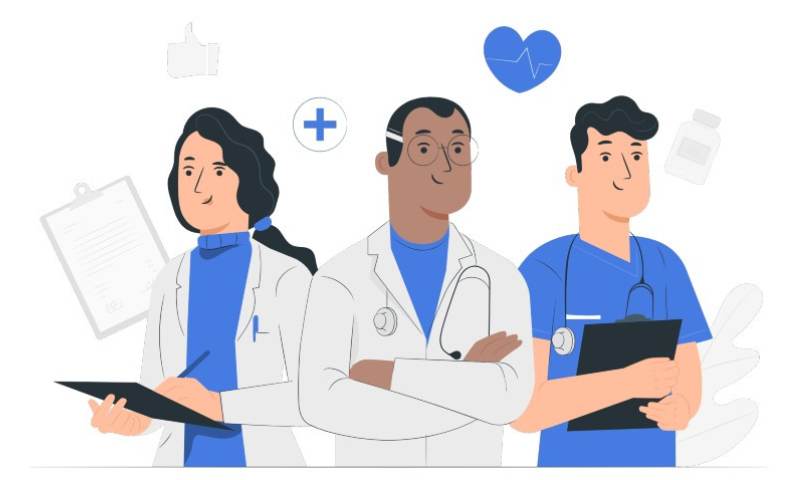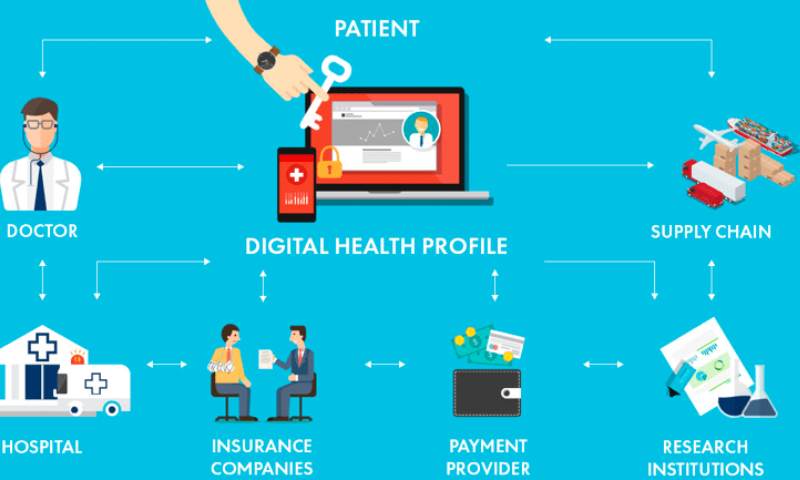Imagine a world where your medical records are secure, accessible, and transparent. This is the future of blockchain in healthcare—a new era where technology transforms how we manage and deliver care. From protecting patient data better than ever before to streamlining operations, blockchain holds the key to address some of healthcare’s longest-standing challenges. Join me as we explore cutting-edge blockchain applications set to revolutionize healthcare delivery. It’s a journey through enhanced security, improved efficiency, and an unbeatable integrity in medical supply chains. The future is here, and it’s coded for health.
Enhancing Patient Data Security with Blockchain Technology
Strengthening Healthcare Data Security
Let’s talk about keeping health records safe. With blockchain technology in medicine, we make sure only the right eyes see your data. Picture a locker that only you have the key to. That’s what blockchain does for your health info. Bad guys can’t peek in because the lock is super strong. Secure, right?
Now, imagine if all hospitals did this. We’d have fewer healthcare data breaches. Your privacy stays safe. Each record gets its own code. This code changes if anyone tries to mess with it. That’s how we catch folks who try to steal or change your info. Clever, isn’t it?
Upholding Confidentiality in Patient Information
We keep a tight seal on who sees what. Your secrets stay secret. With blockchain, it’s like putting your medical records in a safe. And it’s not just any safe. It’s one that tells you if anyone tries to break in. This means you control who looks at your data. You get peace of mind. Doctors, nurses – they see what they need to help you. No one else.
Even when you switch docs or go to a new place, blockchain helps. It lets your health story travel with you – safe and sound. This way, folks taking care of you get your full history, quick and without mix-ups. And you? You stay the boss of your info. Always.
So here it is: blockchain guards your health records like a fierce dog watches your house. No hacker can just stroll in and poke around. This is us, fighting to keep you safe in this digital world. Together, let’s lock it up tight and throw away the key.
Streamlining Healthcare Operations via Decentralized Records
Boosting Interoperability of Health Systems
Have you ever had trouble getting your health info from one doctor to another? Well, blockchain can fix that. It lets systems talk to each other better. With blockchain, all your health data can link up neatly. This kind of sharing is called interoperability. No more repeat tests or lost files. Your care gets better and faster!
Blockchain tech makes it safe to share patient records. Each piece of information is a block in a chain. No one can change it once it’s there. So, you can trust your health info is right. Doctors anywhere can read your records quickly and with no mistakes. Plus, when you show up for care, everything is ready and waiting.
Empowering Patient Data Management
Your health records belong to you. But keeping them safe can be tough. Blockchain changes that. It keeps your data secure and lets you manage it. So, you control who sees your health info and when.
Think of blockchain as a super-secure locker. Only with the right key can someone peek inside your health info. You hold those keys. You say yes or no to who gets in. Your info stays private, just as it should. If you want to change doctors or visit a new clinic, it is easy. Your records can move with you safely. They are always up-to-date, so your new doctor knows your history.
Blockchain does more than just lock up your data. It lets you track who looks at it. Every peek at your records is noted. So, no sneaky looks without you knowing. This keeps your info safe and sound.
Managing your health info with blockchain is smart. You can trust it’s accurate and only seen by the right eyes. Next time you visit the doc, think how blockchain could help you keep your data close and under lock and key!
Advancing Medical Supply Chain Integrity
Implementing Blockchain for Drug Traceability
Blockchain technology in medicine is making waves, especially with drug traceability. This means we can track medicine from where it’s made right to the patient’s hand. Using blockchain for drug traceability, every pill or syrup’s journey gets locked in. It’s like a digital log that never lies or forgets.
So, how exactly does it help? Say a medicine doesn’t work as it should, or worse, it harms someone. We can use the digital log to track where things went wrong. Did the bad batch come from the factory? Maybe it happened during shipping? With blockchain, we find out fast. It’s a solid tool to fight fake drugs too. This keeps patients safe and drug makers honest.
Ensuring Clinical Trials Data Integrity
Now let’s talk about clinical trials data integrity. Keeping information in clinical trials honest and unchanged is key. It makes sure the results we see are the real deal. For this, we turn to blockchain again. It’s like a safe that keeps this important info locked tight. Only certain people can peek inside.
Why’s this a game changer? It’s simple – trust. When we know the trial data is untouched, we trust the medicine more. This can save lives. It also helps new cures reach us faster. So, blockchain isn’t just about tech. It’s about healing faster and feeling sure about the meds we take. With blockchain’s help, we see fewer errors and more trust in trials.
In each step, from making the drug to testing it, it’s clear – blockchain is a trusted partner. It guards every detail so that what’s meant to heal doesn’t harm. It’s like having a superhero for healthcare, watching over every pill and every piece of data. It’s not just imagining a safer future in healthcare; blockchain is actively building it, one block at a time.
Transforming Healthcare through Integrated Blockchain Solutions
Leveraging Smart Contracts in Healthcare
Imagine a world where mistakes in healthcare vanish. Your health info is a tap away. That’s our future with blockchain in medicine. Smart contracts play a key role here. They are like digital pacts that act when certain conditions meet.
“How do smart contracts make healthcare better?” You might ask. First, they cut delays and errors from handling patient records. They make sure only the right people see your health details.
Doctors and pharmacies use smart contracts to share info fast and right. They check who can get data, then share it quick without mix-ups or peeps from unwanted eyes. This keeps your private details safe and sound. No more worry about who sees what.
Smart contracts help make bills and insurance claims correct and clear, too. They check your treatments against your plan and fix bill mistakes before they happen. Your visit to the doc gets easier, with no billing headaches after.
Promoting Blockchain Medical Billing and Insurance
Now, let’s talk about blockchain for health insurance and bills. We all know these can be a pain. Blockchain changes that. How? It makes bills and insurance work together like good friends.
Picture getting a bill that’s ready to pay, no questions asked. Blockchain makes sure your bill is clear and matches your insurance. No calling back and forth. No wrong bills. Happy days!
This tech fights fraud, too. No one can make fake bills or wrong insurance claims. Every bill and claim is like a piece stamped in stone. No changes unless all sides agree.
And that’s not all. This stuff also helps manage your health cash, even for drugs. Every pill you take gets tracked. From the maker to your hand, blockchain is there. It’s like having a bodyguard for your meds.
What we see now is just the start. Soon, your whole health story could live on a safe, fast blockchain. You control who sees it. You share what you want. Your health, your rules.
That’s a peek into the future where blockchain tech brightens healthcare. Blockchain is not just a buzzword; it’s the ticket to a new way of trust and ease in keeping us all healthy.
In this post, we dug into how blockchain can change healthcare for the better. We looked at how it beefs up data safety and keeps patient details under wraps. Then, we saw how it can make health systems talk to each other better and put patients in charge of their own info. We also touched on how blockchain can make sure drugs are tracked right and clinical trial data stays honest.
Finally, we explored how smart contracts can make healthcare smarter and how blockchain can improve billing and insurance. All in all, blockchain could be a game-changer in healthcare, making it safer and more efficient. I trust this rundown has given you a solid grasp of blockchain’s promise for a better health system. It’s a powerful tool that we can’t ignore. Let’s embrace this tech to unlock a healthier future for everyone.
Q&A :
How is blockchain revolutionizing healthcare?
Blockchain technology is poised to revolutionize the healthcare industry by enhancing the security, privacy, and interoperability of health data. This innovative approach ensures a more seamless and safe transmission of medical records, streamlines the drug supply chain, and offers a new model for health information exchanges by establishing a single, unified source of truth.
What benefits does blockchain offer to healthcare providers and patients?
Blockchain technology offers numerous benefits to healthcare providers and patients alike. For providers, it brings about improved data security, reduced operational costs through the removal of intermediaries, and more efficient management of the drug supply chain. Patients stand to gain from enhanced privacy and control over their medical records and can also experience a reduction in healthcare fraud.
Can blockchain improve healthcare data security?
Certainly, blockchain can significantly improve healthcare data security. By design, blockchain’s distributed ledger technology allows for the creation of immutable and tamper-proof records, ensuring that health data remains secure and unaltered. This is particularly crucial in the healthcare sector where the confidentiality and integrity of patient information are of paramount importance.
How might blockchain impact the future of electronic health records (EHRs)?
Blockchain holds the potential to transform the future of electronic health records (EHRs) by enabling a decentralized and secure way to store patient health information. It facilitates an environment where EHRs can be accurately and securely accessed across different systems and stakeholders, thus improving data accuracy, enhancing patient data control, and reducing instances of duplicate records.
What challenges exist for the adoption of blockchain in the healthcare industry?
Despite its potential, the adoption of blockchain in healthcare faces several challenges. Interoperability between disparate healthcare systems, the considerable cost of blockchain implementation, and the inherent complexity of technology itself are substantial hurdles. Additionally, regulatory and compliance issues, along with the need for widespread stakeholder collaboration, also present significant barriers that must be addressed for blockchain to be fully integrated into the healthcare infrastructure.


